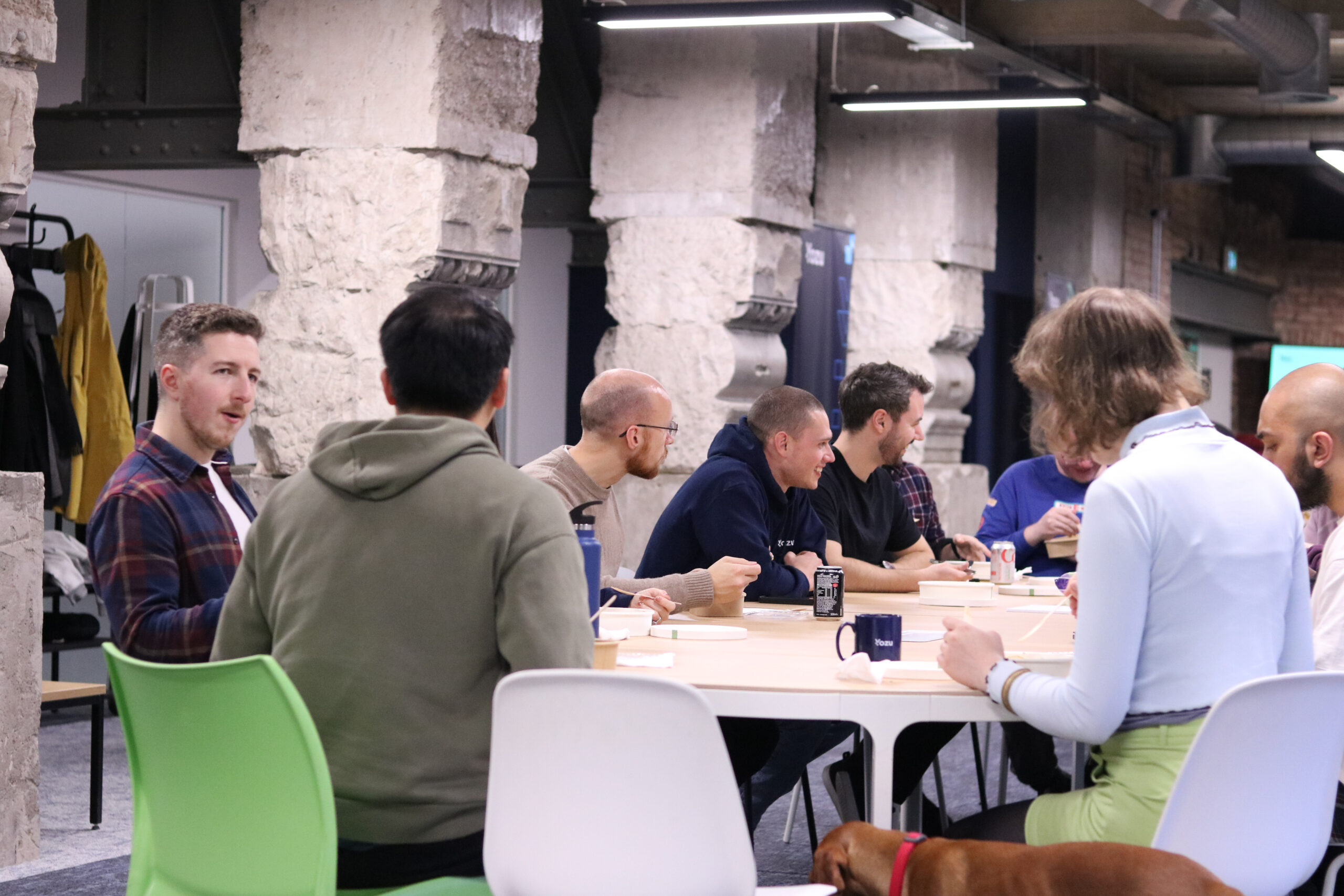Career Change to Coding? Here’s How Daz Did It
Our new Ruby Engineer Daz made the brave leap from teaching to coding this year.
It was a career change that might sound daunting to some – but he made all the right moves. We caught up with him to understand how he did it, and what honest advice would he give to someone setting out on their career change journey.
What were you doing before the career pivot to software developer?
I started teaching Maths straight after I graduated. I’ve always enjoyed helping people learn new things and wanted to pass on my passion for maths and problem-solving.
My other passion was web development, which I pursued in my spare time. I taught myself some basic HTML, CSS, and JavaScript. I made some basic websites, then taught myself to program in Ruby and discovered the Ruby on Rails framework.
I had a successful career teaching Maths and Further Maths at GCSE and A-Level, achieving some good grades and helping students who were applying for the top universities and bursary schemes such as CyberFirst.
I continued to pursue my hobby of building websites and web apps and blogged about my experience. This led to me writing articles for the online web development resource, SitePoint, who had also asked me to write books for them – one about the Sinatra Ruby microframework and two about JavaScript.
So, What Changed?
Despite really enjoying teaching, I’d often think about turning my passion for coding into a career in software development. These feelings grew stronger after helping students build and deploy their JavaScript applications as part of the Computer Science A-Level.
I was finding my hobby more interesting than my actual day job. I wanted to see if I could code at a professional level. I also felt I’d reached a plateau in teaching and had achieved everything I’d wanted to do. The web development itch continued to grow, and during the Christmas holidays, I decided to go for it in 2024.
Where did you start the process of career change?
To prepare for a career in web development, I decided to act as if I was already a web developer to get into the right mindset. I made sure I coded every day and did as much reading about development as possible, trying to identify any skills I needed to include.
I contacted my local Ruby User Group and received lots of encouragement and helpful messages. Their main recommendation was to build things that show I can solve specific problems. They also suggested improving my skills by using a free online resource called the Odin Project. They also told me about the first Ruby Friend Mentor Scheme, which put me in touch with somebody working in the industry to help and support me with anything.
I learned a lot from this and am still in touch with my mentor. I also got an offer to help with a volunteer project, which was invaluable. It gave me some experience working with professional coders and showed me what it was like to work on a large codebase, which I hadn’t had much experience with before. It also helped keep me busy and expand my contacts in the industry.
How did you zero in on the job market?
Obviously, a priority was finding a job. I set up a LinkedIn profile and updated my CV to focus on my development skills. I soon realised I needed some examples of my work to show off, so I built a portfolio site.
I also started to send out applications. I sat back, waited for the invitations to interview, and thought about which company I’d rather work at. Then the rejections started arriving—lots of them.
The reason was often ‘no experience’… I’d run into that classic problem of ‘how you get the experience if every job asks for it?’. Many companies seem to have unrealistic expectations, listing a smorgasbord of required skills and a minimum number of years of experience, even for the most junior developer roles.
My initial applications were for general web developer jobs, but I soon realised I should focus on a particular skill. A recruiter mentioned to me that it was tough to find Ruby developers, so I decided to highlight the fact that I could code in Ruby a lot more on my profile.
The many rejections got disheartening at times, but I kept plugging away, hoping I’d get a chance to show what I could do. Thankfully, some companies can look past the lack of direct experience in the industry and see that you offer several transferable skills from your previous career.
What accelerated your progress in the job hunt?
Job recruiters can have a mixed reputation – and they can be occasionally frustrating to work with at times from the candidate’s point of view – but I found them to be very helpful at opening doors and pointing me in the right direction. In particular, Charlie at HyperLoop helped me to improve my CV and secured my first recruiter-introduced interview at a company called Yozu, who were looking for a Ruby developer.
I remember hearing I’d been requested to attend a first interview with them and being so happy – but also extremely nervous! I didn’t know what to expect, but it was a really lovely experience. They put me at ease, understood my situation, and made the interview feel like talking about my hobby with fellow enthusiasts.
The last part of the process was to attend the Yozu office for a full ‘tech and team’ day, which included building a small, working application. It was also a chance to meet the other team members and get a feel for the culture.
The tech and team day was my favourite part of the recruitment experience, especially as it was my first chance to work as a ‘proper’ developer in a vibrant office. I was so excited and determined to enjoy that day, even if I didn’t ultimately get the job.
But I must have done something right because a few days later, I had a call with the CEO Luke, who offered me a mid-level software developer role!
It was a dream come true after all the hard work and rejections.
So, how’s it going at Yozu?
So far, I’m loving my start at Yozu. It’s such a lovely place to work with really nice people who are always willing to help with anything as well as up for a laugh and a joke.
I have been really pleased with the technical challenges on my first project and how it helps my Ruby skills improve daily. For example, I’ve already learnt so much about testing and deployment. Getting used to things like Agile working with daily stand-ups, and interacting with the Jira board process has been party of my learning curve
There are also perks at Yozu, like working from home, free lunches in the office and after-work socials. The best thing of all is that I’m getting paid to work on something I’ve already been doing for free because I love it so much.
Everyone here has a similar passion for coding and making excellent products. That helps me maintain my energy and enthusiasm for this new role. Every day, I come into work excited for the day ahead. I’ve got the enthusiasm of a graduate just starting out in the world of work, but with the experience of working in another role for many years.
What final advice would you give to a fellow career-changer?
My advice for anyone who is thinking about changing careers into software development is to just go for it! Especially if you’ve already got some coding experience (and if you haven’t, there are plenty of places you can learn online).
It’s been such an exciting time and has given me a massive boost of motivation. I’m learning new things every day and enjoying the whole process.
Getting some traction in the recruitment process with companies can take a while, especially if you have yet to gain experience. Still, if you have the skills, then eventually, the right company will find you and be able to see the potential you offer.
Also – don’t forget to sell the fact that you have other skills that you’ve picked up from your previous career. Keep coding and believe in your ability. Make lots of contacts and interact with people. The more contacts you make, the more chance you have that a job will come up.
The right job is out there, and you’ll get it if you don’t give up!
If you’re looking to switch career to software development, try this:
- Pursue Passion Projects: Continuously engage in coding projects, even as a hobby, to build skills and experience.
- Join Professional Communities: Engage with local user groups or online communities for support, advice, and networking.
- Seek Mentorship: Find a mentor in the industry to provide guidance and support, possibly through formal programs like the Ruby Friend Mentor Scheme.
- Gain Practical Experience: Participate in volunteer projects or internships to work on large codebases and gain real-world experience.
- Create a Portfolio: Develop a portfolio site to showcase your projects and skills to potential employers.
- Tailor Job Applications: Customize your CV and job applications to highlight specific skills, especially those in demand, like Ruby in this case.
- Utilise Recruiters: Leverage recruiters to help navigate the job market and improve your application materials.
- Be Persistent: Keep applying and refining your approach even after receiving rejections; the right opportunity will eventually come.
- Showcase Transferable Skills: Emphasize skills from previous careers that are applicable to software development, such as problem-solving or project management.
- Embrace Learning and Adaptation: Be open to learning new technologies and adapting to new work environments, like Agile methodologies.
- Network Actively: Build and maintain professional contacts within the industry to increase job opportunities.
Words: Darren Jones
[calltoaction content=”Do you want to learn more about a career at Yozu?” url=”https://yozu.co.uk/contact/” button_text=”Get in touch” background=”navy”]



